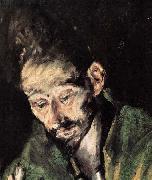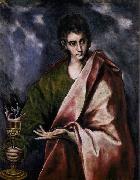All GRECO, El Oil PaintingsGreek-born Spanish Mannerist Painter, 1541-1614 |
|||
 |
|||
|
|
|
||||||||||
|
|
||||||||||
|
The Adoration of the Shepherds Gemälde IDENTIFIZIERUNG:: 62328 |
The Adoration of the Shepherds 1614 Oil on canvas Museo del Prado, Madrid The picture shows the head of one of the shepherds. 1614 Oil on canvas Museo del Prado, Madrid The picture shows the head of one of the shepherds. |
|||||||||
|
|
||||||||||
|
|
St John the Evangelist Gemälde IDENTIFIZIERUNG:: 62330 |
St John the Evangelist 90 x 77 cm Museo del Prado, Madrid There is an analogous version in the Cathedral of Toledo which is part of a series of the twelve Apostles, called Apostolados. It is assumed by some scholars that this painting also belonged to a similar series. Author: GRECO, El Title: St John the Evangelist , 1551-1600 , Spanish Form: painting , religious 90 x 77 cm Museo del Prado, Madrid There is an analogous version in the Cathedral of Toledo which is part of a series of the twelve Apostles, called Apostolados. It is assumed by some scholars that this painting also belonged to a similar series. Author: GRECO, El Title: St John the Evangelist , 1551-1600 , Spanish Form: painting , religious |
||||||||
|
|
||||||||||
|
|
Adoration of the Shepherds Gemälde IDENTIFIZIERUNG:: 62331 |
Adoration of the Shepherds 11 x 47 cm Galleria Nazionale d'Arte Antica, Rome The two paintings in the Galleria Nazionale d'Arte Antica in Rome (Adoration of the Shepherds, Baptism of Christ) were considered workshop pieces or autograph replicas of two of the three pictures that El Greco executed for the Colegio di Do?a Mar?a de Arag?n in Madrid (now dispersed and housed in the Muzeul de Arta, Bucharest and the Museo del Prado, Madrid). However, a recent radiographic analysis (1997) has proven that they are original oil sketches by the hand of El Greco himself. The presence of pentimenti, compositional emendations beneath the paint surface, reveals the creative process of the artist and leads to the conclusion that these are not copies but preparatory bozzetti for the Madrid cycle. The important commission, probably designed as a triptych to decorate the high altar of the chapel, was given to El Greco in 1596: work continued until the Holy Year of 1600. The third oil sketch, depicting the Annunciation, is preserved at the museum in Bilbao. The silvery light, the coloristic range based on cold tones, the quick, almost impressionistic brushwork and the use of strong contrasts of light and shadow in this picture are all typical characteristics of El Greco's Spanish manner (1576-1614). Author: GRECO, El Title: Adoration of the Shepherds , 1551-1600 , Spanish Form: painting , religious 11 x 47 cm Galleria Nazionale d'Arte Antica, Rome The two paintings in the Galleria Nazionale d'Arte Antica in Rome (Adoration of the Shepherds, Baptism of Christ) were considered workshop pieces or autograph replicas of two of the three pictures that El Greco executed for the Colegio di Do?a Mar?a de Arag?n in Madrid (now dispersed and housed in the Muzeul de Arta, Bucharest and the Museo del Prado, Madrid). However, a recent radiographic analysis (1997) has proven that they are original oil sketches by the hand of El Greco himself. The presence of pentimenti, compositional emendations beneath the paint surface, reveals the creative process of the artist and leads to the conclusion that these are not copies but preparatory bozzetti for the Madrid cycle. The important commission, probably designed as a triptych to decorate the high altar of the chapel, was given to El Greco in 1596: work continued until the Holy Year of 1600. The third oil sketch, depicting the Annunciation, is preserved at the museum in Bilbao. The silvery light, the coloristic range based on cold tones, the quick, almost impressionistic brushwork and the use of strong contrasts of light and shadow in this picture are all typical characteristics of El Greco's Spanish manner (1576-1614). Author: GRECO, El Title: Adoration of the Shepherds , 1551-1600 , Spanish Form: painting , religious |
||||||||
|
|
||||||||||
|
|
The Annunciation Gemälde IDENTIFIZIERUNG:: 62332 |
The Annunciation 315 x 174 cm Museo del Prado, Madrid The "expressionist" stylistic traits, characteristic of El Greco's paintings at the end of the 1590s, are also found in the paintings of a retable El Greco created for the Augustinian college of Nuestra Se?ora de la Encarnacion in Madrid between 1596 and 1600. The patroness of the college, the lady-in-waiting Do?a Mar?a de Cordoba y Arag?n, had died back in 1593, implying that the commission likely came from her executor. The retable, like many other works in possession of the Church, was disassembled into its component parts during the French occupation of Spain. All we know from the surviving written sources is that El Greco supplied a total of seven paintings. This Annunciation in the Prado is one of these paintings, and it is an especially good example of the daring palette that characterizes the entire series. At the bottom of the canvas, the terrestrial world is barely indicated by the steps, sewing basket and rose-bush in flame. The flames are rendered so naturalistically that they probably have appeared to mirror the real candle flames burning on the altar during the celebration of the Mass. But above and beyond El Greco has distorted light, colour and form. Indeed,all the form are in a state of flux. the grand rhythm of the wings of Gabriel and the Holy Spirit quicken the drama. Garments of crystalline blue, crimson and yellow-green vibrate against the blue-grey void. Incandescent light is reflected off the figures with such intensity that each seems to be its own source of light 315 x 174 cm Museo del Prado, Madrid The "expressionist" stylistic traits, characteristic of El Greco's paintings at the end of the 1590s, are also found in the paintings of a retable El Greco created for the Augustinian college of Nuestra Se?ora de la Encarnacion in Madrid between 1596 and 1600. The patroness of the college, the lady-in-waiting Do?a Mar?a de Cordoba y Arag?n, had died back in 1593, implying that the commission likely came from her executor. The retable, like many other works in possession of the Church, was disassembled into its component parts during the French occupation of Spain. All we know from the surviving written sources is that El Greco supplied a total of seven paintings. This Annunciation in the Prado is one of these paintings, and it is an especially good example of the daring palette that characterizes the entire series. At the bottom of the canvas, the terrestrial world is barely indicated by the steps, sewing basket and rose-bush in flame. The flames are rendered so naturalistically that they probably have appeared to mirror the real candle flames burning on the altar during the celebration of the Mass. But above and beyond El Greco has distorted light, colour and form. Indeed,all the form are in a state of flux. the grand rhythm of the wings of Gabriel and the Holy Spirit quicken the drama. Garments of crystalline blue, crimson and yellow-green vibrate against the blue-grey void. Incandescent light is reflected off the figures with such intensity that each seems to be its own source of light |
||||||||
|
|
||||||||||
| VORHERIGER KÜNSTLER NÄCHSTER KÜNSTLER | ||||||||||
|
|
||||||||||
| GRECO, El | ||||||||||
| Greek-born Spanish Mannerist Painter, 1541-1614 | ||||||||||
|
|
||||||||||
|
KONTAKTIEREN Sie UNS |









